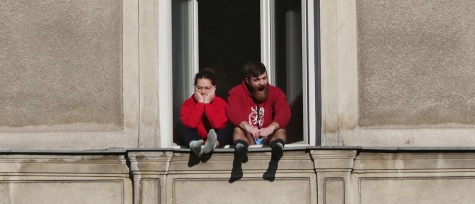
By: Sophia Burick | Editor in Chief
April 20, 2020
What do you think about when you hear the phrase “existential crisis”? Sadness? Lack of fulfillment? A middle-aged man with a few too many cars?
What it really comes down to is finding yourself living a life that lacks inherent purpose or meaning.
That sounds scary, but existentialism isn’t really that bad. Existentialist theory promotes the idea that the world has no inherent meaning (not to be confused with nihilism, which states that nothing has any meaning at all). This means that, according to the Cambridge Dictionary, “each person is …completely responsible for their own actions, by which they make their own character.” In that sense, existentialism just tells us that it’s up to us to decide what is meaningful to us and follow that path.
This outlook is incredibly relevant to our present situation. Many things that society has long heralded as indicators of our meaningfulness and purpose—like working productively, succeeding in a sport, or going to church—have been made impossible. I, and I know many others, have found myself spending hours of each day of lockdown sitting at home doing nothing productive. This situation has led many people to have a small existential crisis—if we’re not doing the things society has traditionally deemed meaningful, is there any purpose to our lives?
The answer is yes. Existentialism is all about embracing your own standards of what makes you feel meaningful and purposeful, not society’s. And I think that we all have to spend some time in this lockdown reconsidering how we should define our personal meaning and purpose. Instead of valuing how high your income is, value how much time you spend with your family. Instead of valuing your work productivity, value your ability to pursue hobbies and passion projects. We can find an incredible amount of meaning in this time if we just find inspiration in the flexibility of existential meaning.
The deeper issue is the meaning that each of us subconsciously place on subjective fulfillment, or the achievement of arbitrary goals we set for ourselves that are often influenced by society’s standards, like getting into your dream college, landing the perfect job, and making a certain salary. While these goals can be motivating, they fail to account for the wonderful meaning that we can find in the process toward these goals. Focusing on subjective fulfillment discourages us from finding beauty and meaning in the little things—the little things that are keeping us going during this unprecedented quarantine.
“I keep setting goals for myself again and again and again and it feels like an endless struggle leading to what; Subjective fulfillment serves as a temporary distraction” then-high school senior Siddharth Gupta said in his TED talk “Confessions of An Existential Nihilist.”
I completely agree. If this pandemic has taught us anything, it’s that the runaway train of life has no consideration for the subjective goals we set for ourselves and find meaning in—in a matter of weeks, my plans have changed from enrolling at my dream university in the fall to taking a gap year with little to no plan for the next twelve months. So, it’s up to us to find meaning along the way, whatever way that is, by embracing the chaotic beauty of existentialism.

I love Sophia’s viewpoint and how she tackled and debunked the stigma around existentialism. In my own opinion, the idea that the world has no inherent meaning gives individuals the opportunity to imprint their own values and dictate their own destinies with less bias/influence from conventional society.
I thought that the writing in this piece was very good, and very relatable.
Wow! What a great way to see the positives of quarantine! When the whole world changes, it definitely does call into question what is really important in life. Hopefully people come out of this with redefined values and a greater sense of personal identity!! It will definitely be interesting to see how COVID may redefine societal norms and create a greater emphasis on human connection over empty materialism.
Really good article! I like the way the article started by introducing what most people think of when it comes to existentialism, and throughout the article we learn that existentialism isn’t necessarily a bad thing because it just means that you decide what is important to you without letting societal norms tell you what to do.
I loved reading this article, it really shed a new light on quarantine. Especially reading it after the initial panic wave has kind of died down, I really liked reading a less pessimistic view on everything going to ‘ruins’.